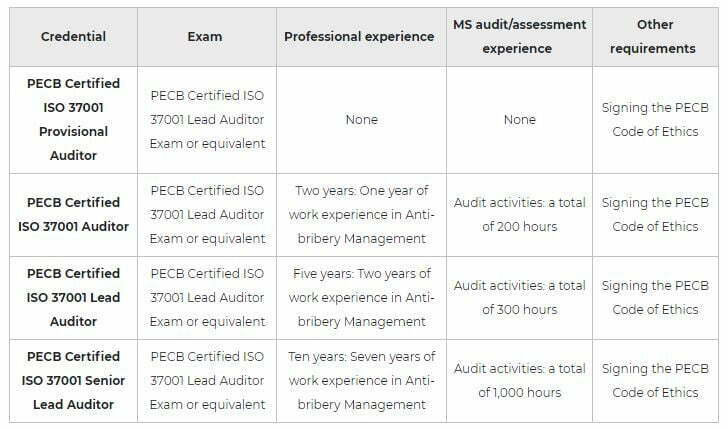TRAINING DAYS: 5
(4 days of training + 1 day exam)
CPD CERTIFICATION
31 Credits
EXAM DURATION
3 Hours
EXAM RETAKE POSSIBLE?
Yes. Free one more exam in 12 months
WHAT IS INCLUDED?
Training, PECB exam and certification
Why Should You Attend?
The PECB Certified ISO 37001 Lead Auditor training course provides the necessary knowledge and skills that enable you to perform anti-bribery management system (ABMS) audits by applying widely recognized audit principles, procedures, and techniques.
Many organizations seek competent auditors to determine whether the policies and anti-bribery controls, implemented as part of an ISO 37001-based ABMS, are effective. This training course aims to help you complete these tasks successfully and intends to reflect the importance of effective ABMS audits. Additionally, it aims to strengthen your knowledge and skills to plan and carry out ABMS audits in compliance with the guidelines for auditing management systems provided in ISO 19011 and the certification process described in ISO/IEC 17021-1.
The exercises, quizzes, and case studies provided are designed to help you practice the most important aspects of an ABMS audit: ISO 37001 requirements, auditing principles, tools and techniques used to obtain evidence, leading a team of auditors, conducting interviews with auditee, reviewing documented information, drafting nonconformity reports, and preparing the final audit report.
The successful completion of the training course is followed by an exam. If you pass the exam, you can apply for the “PECB Certified ISO 37001 Lead Auditor” credential. An IAS accredited and internationally recognized “PECB ISO 37001 Lead Auditor” certificate validates your professional capabilities and demonstrates your ability to audit an ABMS based on ISO 37001.
Who Should Attend?
Learning objectives
This training course will enable you to:
Educational approach
Prerequisites
The main requirements for participating in this training course are a fundamental understanding of ISO 37001 requirements for an ABMS and a comprehensive knowledge of audit principles.
Course Agenda
Day 1: Introduction to the anti-bribery management system (ABMS) and ISO 37001
Day 2: Audit principles and the preparation for and initiation of an audit
Day 3: On-site audit activities
Day 4: Closing of the audit
Day 5: Certification exam
Examination
The “PECB Certified ISO 37001 Lead Auditor” exam fully meets the requirements of the PECB Examination and Certification Program (ECP). It covers the following competency domains:
Domain 1: Fundamental concepts and principles of a compliance management system
Domain 2: Compliance management system requirements
Domain 3: Fundamental audit concepts and principles
Domain 4: Preparing an ISO 37001 audit
Domain 5: Conducting an ISO 37001 audit
Domain 6: Closing an ISO 37001 audit
Domain 7: Managing an ISO 37001 audit program
General Information
1. Certification fees are included in the exam price.
2. PECB will provide training material of over 450 pages of information and practical examples.
3. An attestation of course completion worth 31 CPD (Continuing Professional Development) credits will be issued to participants who have attended the training course.
4. In case of exam failure, the candidate can retake the exam once for free within 12 months following the initial exam date.
Certification
Upon the successful completion of the exam, you can apply for one of the credentials shown in the table below. You will receive a certificate once you fulfill all the requirements related to the selected credential.
The PECB ISO 37001 Auditor certification scheme has the following requirements:

Note: PECB certified individuals who possess both the Lead Implementer and Lead Auditor credentials are qualified for the respective PECB Master Credential, given they have taken 4 additional Foundation Exams related to this scheme. For more information about the Foundation Exams and the overall Master Requirements, please go to PECB Master Credentials.
To be considered valid, the audit activities should follow best audit practices and include the following:
1. Planning an audit
2. Managing an audit program
3. Drafting audit reports
4. Drafting nonconformity reports
5. Drafting audit work documents
6. Reviewing documented information
7. Conducting on-site audit
8. Following up on nonconformities
9. Leading an audit team


